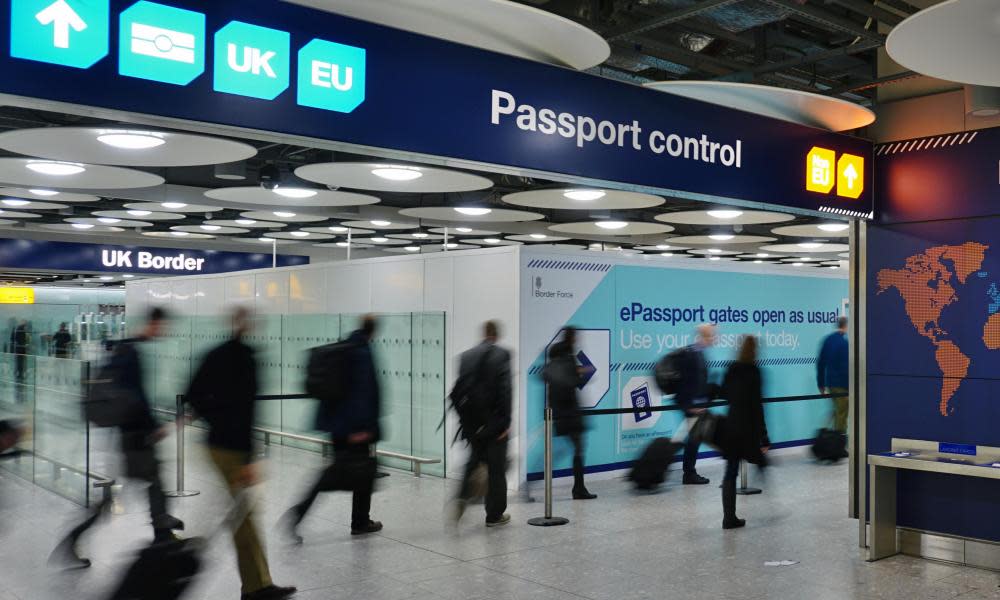EU to ask UK to respect citizens’ rights after mistreatment scandals

EU leaders will call on Boris Johnson to respect the rights of their citizens in the wake of scandals over their treatment in the UK, including their detention in removal centres, according to a leaked draft statement seen by the Guardian.
The message to the British prime minister will follow a first discussion of EU-UK relations between the 27 heads of state and government since the ratification of the trade and cooperation agreement struck last Christmas Eve.
“The European Council calls on the UK to respect the principle of non-discrimination among member states and the rights of EU citizens,” the leaders are due to say, adding that the deals agreed with Downing Street must be implemented in full.
There is growing concern within EU capitals over the UK government’s approach to their nationals, including those whose rights are guaranteed by the tortuously negotiated Brexit withdrawal agreement.
A new body set up under the withdrawal agreement to ensure citizens’ rights are upheld after Brexit has said it is “actively considering” statutory action against the Home Office due to the difficulties for EU nationals in the UK who are seeking so-called settled status.
In a statement issued last week, the Independent Monitoring Authority for the Citizens’ Rights Agreements said it was in talks with the Home Office amid reports of concerns over the application process.
The Guardian has reported on a series of cases where long-term British citizens, including dual nationals, have received letters sent in error by the Home Office instructing them of the risk of losing the right to work, benefits and free healthcare unless they apply for UK immigration status within weeks.
There have in addition been testimonies from EU nationals with job interviews in the UK who say they were denied entry, locked up and forced to endure the traumatic and humiliating experience of expulsion, despite Home Office rules explicitly allowing non-visa holders to enter in such circumstances.
The issues faced by EU nationals in the UK, or seeking entry to the country, are just the latest concerns about the post-Brexit relationship, however.
The leaders’ statement, which could still change before the summit on Thursday of next week, is also due to touch on other areas that have proven highly problematic in recent months, including the rights of EU fishing vessels to operate in British waters.
Earlier this month, Johnson sent two Royal Navy patrol boats to the waters around Jersey in response to the threats of French fishers to blockade the island’s main port over access to the surrounding waters. A French minister had suggested the EU could also cut off Jersey’s electricity supply if the UK did not respect the agreement contained in the trade deal. The EU is concerned that rights agreed over access are being breached through UK red tape.
The biggest looming problem, however, is that of the movement of goods between Great Britain and Northern Ireland, where the European Commission and the UK are struggling to find mutually satisfactory solutions that will both allow untrammelled movement and protect the EU’s single market.
The thorniest issue is that of the food safety and animal and plant health checks and barriers on goods entering Northern Ireland that Brussels says are necessary to maintain the EU’s sanitary and phytosanitary standards.
Lord Frost, the responsible UK minister, is seeking an “equivalence” agreement that would see the EU recognise UK standards as being roughly in line with its own to allow checks to be lifted. But Brussels, in response, is insisting on full alignment in law.
According to the draft statement, the leaders will welcome the trade deal and the withdrawal agreement but insist that “both agreements should be fully and effectively implemented” and offer little hope of movement on the issue of the Northern Ireland protocol.
Related: EU citizens are allowed to visit Britain for a job interview, says minister
They will say: “The two agreements allow for the EU to have as close as possible a partnership with the United Kingdom, while recognising that a non-member of the EU cannot enjoy the same benefits as a member and that the relationship must be based on a balance of rights and obligations at all times.
“Relations with the UK should remain mutually beneficial and can under no circumstances undermine the integrity of the single market, the customs union or the EU’s decision-making autonomy.”
“The European Council invites the commission to continue its efforts to ensure full implementation of the agreements, including in the areas of fisheries and level playing field, in continuous coordination and permanent dialogue with the council and its preparatory bodies in accordance with established practice,” the leaders will add.
“The European Council will remain seized of the matter and the EU will continue to be united in its engagement with the UK.”

 Yahoo News
Yahoo News 
